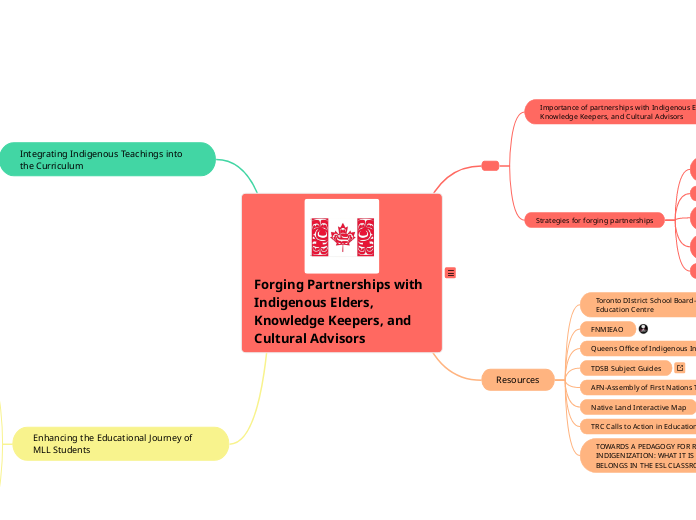Forging Partnerships with Indigenous Elders, Knowledge Keepers, and Cultural Advisors
Importance of partnerships with Indigenous Elders, Knowledge Keepers, and Cultural Advisors
Building trust and understanding in the learning environment
Fostering cultural responsiveness and inclusivity
Promoting reconciliation between Indigenous and non-Indigenous communities
Strategies for forging partnerships
Building relationships based on mutual respect and trust
Engaging in open and ongoing communication
Collaborating on curriculum development and implementation
Seeking guidance and advice on cultural protocols and practices. Appropriation vs. Appreciation
Continuous Learning and Reflection
Resources
Toronto DIstrict School Board-Urban Indigenous Education Centre
FNMIEAO
Queens Office of Indigenous Initiatives
TDSB Subject Guides
AFN-Assembly of First Nations Toolkit
Native Land Interactive Map
TRC Calls to Action in Education
TOWARDS A PEDAGOGY FOR RECONCILIATION–INDIGENIZATION: WHAT IT IS AND WHY IT BELONGS IN THE ESL CLASSROOM
Integrating Indigenous Teachings into the Curriculum
Importance of integrating Indigenous teachings
Promoting cultural understanding and respect
Creating a more inclusive and diverse curriculum
Enhancing the educational experience for all students
Effective ways to integrate Indigenous teachings
Incorporating Indigenous perspectives and knowledge across subject areas
Including Indigenous stories
literature
and art in the curriculum
Incorporating Indigenous languages and traditional practices
Integrating Indigenous perspectives on wellness and traditional plants and medicines
Enhancing the Educational Journey of MLL Students
Importance of the Indigenous framework of Elders, Knowledge Keepers, and Cultural Advisors
Providing guidance and support for MLL students
Enhancing cultural identity and pride
Promoting a sense of belonging and well-being
Ways to enhance the educational journey of MLL students
Incorporating Indigenous perspectives and teachings in language instruction
Providing opportunities to learn from Indigenous Elders and Knowledge Keepers
Creating a safe and inclusive learning environment that celebrates diversity
Promoting dialogue and understanding between Indigenous and non-Indigenous students
Embedding Indigenous Perspectives Across Subjects
Experiential Learning Opportunities
Promoting Cross-Cultural Dialogue
Connecting histories of colonialism
